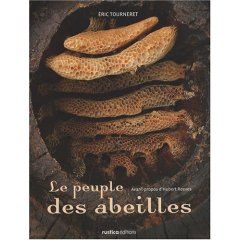
I bought this book just as a treat, because the pictures in it are too beautiful. Now the passion for honeybees is growing on me and Antonia. In another life, a life in which my husband was not allergic to honey and I traveled less, I think I would be a beekeeper. I’m fascinated by their senses, their communication, their life cycles and their castes. I’m blown away that they have five eyes of two different types, and two kinds of ‘ears’. And that the workers cycle through a series of tasks during their life, from comb maintenance to brood nursing, guarding to gathering, and that they develop the appropriate organs accordingly. And the stuff that they collect and produce is so attractive to the senses: pollen, nectar, honey, wax, propolis. They’re so furry, I could cuddle them if they didn’t sting, and they have such a hypnotic hum.
In my dreams, I would have a natural observation hive, in which I could just watch the bees do their own thing, and maybe pinch one of their smaller combs from time to time. In fact, the hive I want is this one, below. Maybe I could get those people to swap houses with me! The wild combs are so beautiful, I just can’t help wanting to reach up and steal one, and munch straight into it. They look like galettes, and they must be appealing to some very primitive instinct in me. I don’t think the manmade combs are pretty at all.
Taken by Max xx, a fellow Brit in France, apparently, from Flickr with a CC licence.
Poor bees. They have been having such a hard time lately. It would practically be a civic duty to let some live behind my shutters. Can you just hear me talking myself into something here? In my obsession, I’ve been reading everything I can find about bees. Some proponents of natural bee-keeping like this one, think the bees will do better in more natural conditions. Standard bee-keeping encourages them to build bigger cells and bigger bodies, produce more honey and less wax than they might choose, get moved around so that they produce honey from single plants, refrain from their usual reproductive activities if possible, and live off sugar syrup once the results of their labour has been harvested. When you look at it like that, it’s no wonder they’re struggling. And those nasty artificial combs don’t look nearly so hygienic, safe or well-ventilated as the natural ones, to me.
I was musing on this today, and it suddenly struck me as a pretty good metaphor of homeschooling versus schooling. Like the standard hives, schools provide a ‘safe’, prepared environment that’s designed to draw out some human characteristics further than they might otherwise go while repressing others, and train kids in the habit of over-productivity. Turns out the environment isn’t as safe as all that, and the kids end up weakened in various ways. Then lots of us go on to live adult lives that are much the same. Too much working to produce honey/knowledge/money and the honey ends up too thin, too purified and easily diverted to other people’s ends. Not enough wax, the relationships and life skills that hold people’s lives together in the first place. Bzzzzzz…. I imagine this metaphor will only make sense to me.
